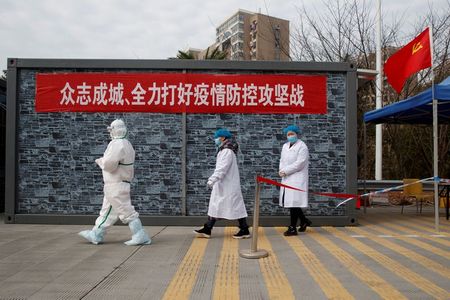By Alexandra Harney
HONG KONG (Reuters) – The coronavirus epidemic has shined a spotlight on another simmering crisis in China’s healthcare system: a critical shortage of doctors.
Rising demand for health care has far outpaced the increase in the supply of doctors. Between 2005 and 2018, the number of fully licensed doctors nearly doubled, but the number of hospital admissions nearly quadrupled, according to Chinese government data. The result is a vicious cycle, doctors and industry consultants say.
“There are less doctors to see more patients, and the patients are frustrated that they don’t get more time with doctors, and they take that out on the doctors, and those doctors go home and tell their kids never to become a doctor,” said Scott Rein, founding principal of China Healthcare Advisory Group, a Shanghai-based consultancy that advises hospital operators, investors and physicians’ groups.
Chinese doctors face unusual risks. Verbal and physical assaults are common. Nearly two-thirds of Chinese doctors have been involved in disputes, according to the Chinese Medical Doctor Association, an industry group.
In December, a man killed a doctor at a Beijing hospital after a disagreement over his mother’s care.
“Every doctor has experienced some kind of abuse,” said He Jiye, an orthopedic surgeon in Shanghai.
Although China has public and private medical care, most top doctors are at public hospitals, which attract the most patients. Jane Xiao, a pediatrician in Xiamen, in southeast China, said that one doctor might see more than 100 children for physicals in one morning at the hospital where she works.
The government has tried to relieve pressure on public hospitals by promoting community hospitals and allowing public system doctors to also work at private clinics. But some public hospitals threaten to fire those who moonlight elsewhere, one doctor said.
Pay is another issue. Only 8.1 percent of medical workers are happy with their wages, according to a 2018 survey by DXY, a Chinese online platform for healthcare information.
Many students who study medicine do not go on to practice it, doctors say. Better pay and working conditions at pharmaceutical companies, among other professions, lure medical students and professionals, doctors say.
The Feb. 7 death of Li Wenliang, the ophthalmologist who was among the first to call attention to the coronavirus, and the death of the director of a Wuhan hospital this week have called attention to the risks those treating the disease face.
More than 1,700 medical staff have been infected and six have died, the National Health Commission said last week.
In recent weeks, Chinese state news agencies and images on social media have depicted the exhausting conditions that engulf doctors battling the epidemic. But doctors told Reuters they doubted the crisis would lead to a long-term improvement in their reputation.
A Feb. 14 post on Weibo, the Twitter-like social media platform, read: “This epidemic has shown how lacking in resources our medical system is. And with all the evil attacks on doctors in recent years, there will definitely be fewer people willing to study medicine.”
(Reporting By Alexandra Harney. Additional reporting by Beijing and Shanghai newsrooms. Editing by Gerry Doyle)


